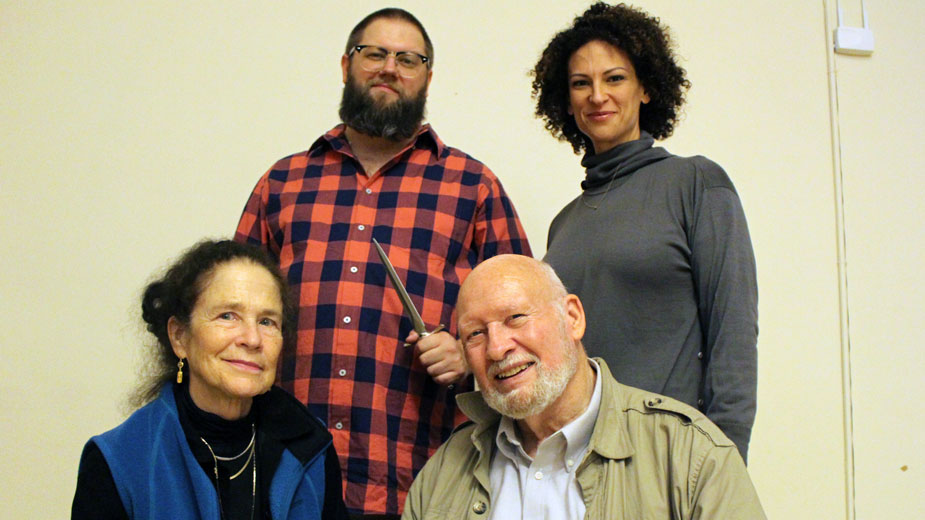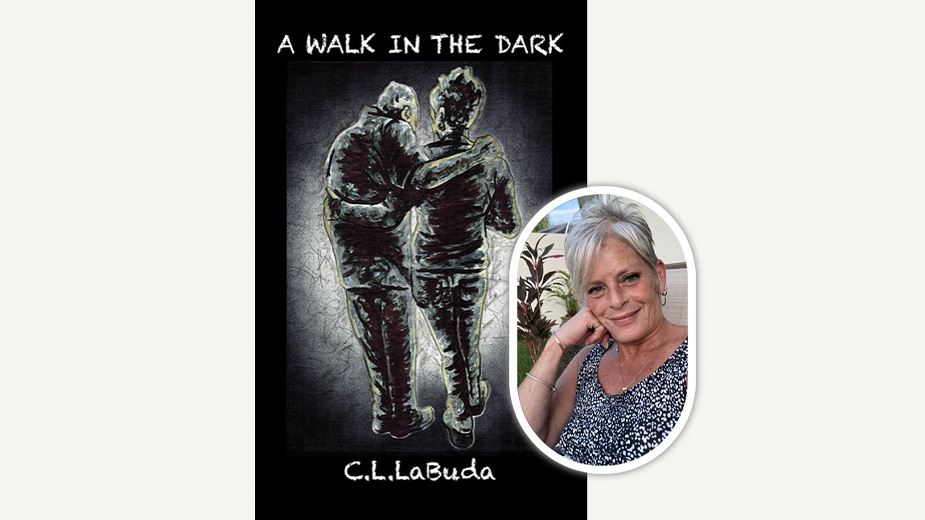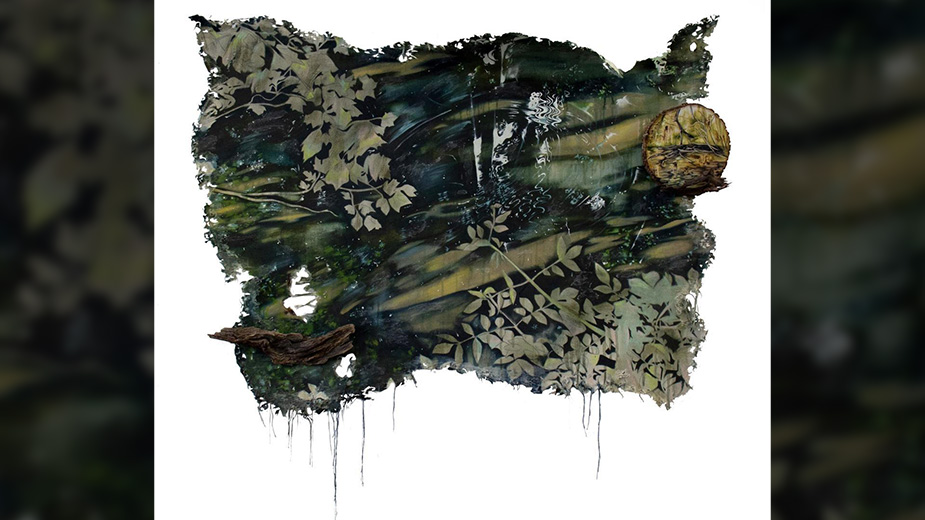Opera Western Reserve Takes on Dark, Bloody ‘Macbeth’
YOUNGSTOWN, Ohio – “I fell in love with this opera in my late teens and early 20s, and this will be my second, and final, chance to direct it,” says David Vosburgh, who is directing Opera Western Reserve’s production of Verdi’s “Macbeth.”
After a lifelong career as an opera singer, director and instructor, Vosburgh is going to retire. “ ‘Macbeth’ is my swan song,” he says.
The opera will be performed at 7:30 p.m. Nov. 15 at Stambaugh Auditorium.
Scott Skiba, who has been a frequent collaborator with OWR over the years, will take the helm of Opera Western Reserve after Vosburgh departs. Skiba, who directed OWR’s 2016 production of “Carmen,” is artistic director of Cleveland Opera Theater and head of the opera department at Baldwin Wallace University.
“We’re fortunate to have him,” says Vosburgh. “He’s also half my age, knows the area, knows the singers and knows the business inside and out.”
Skiba, a Pittsburgh native who lives in Cleveland, says he was “flattered” when offered the job.
“It means a lot,” he says. “I first worked there in 2006 and had always heard great things about OWR, that they had high artistic standards.”
It was in 2016 during “Carmen” that the OWR board first broached the topic of Skiba taking over the reins.
With music director Susan Davenny Wyner remaining with Opera Western Reserve, Skiba expects the transition to be smooth.
“Susan and I work well together,” he says. “I’m not going to come in and reinvent the wheel. We’ll continue to look for ways to deliver the most excellent quality possible and do opera that people want to see.”
Opera Western Reserve’s solid reputation is a testament to Vosburgh’s many skills, says Skiba.
“Macbeth,” adapted by Verdi from the Shakespeare tragic play, is a murderous tale of ambition, betrayal and treachery.
“Macbeth has a premonition that he would be the king, so his wife puts everything in motion and that starts a trail of blood that continues to the end,” says Vosburgh.
The two main characters are King Macbeth and Lady Macbeth, played by Michael Young and Diana Farrell.
The production marks the first time the two, who have been involved in multiple OWR productions, are working together as co-leads, a fitting subplot for this time of transition at the opera company.
Verdi’s “Macbeth” closely follows the Shakespeare script.
“Shakespeare was very much respected by Verdi,” says Vosburgh, “and this is the first of his plays that [Verdi] adapted. It is true to the play. Simplified of course because it takes longer to sing than speak, but it follows the characters closely.”
The story of “Macbeth” is a well-known one, with characters who are “vital and real,” says Vosburgh. “They are involved in the events of their lives, making mistakes and ruining themselves.”
The music, says Vosburgh, amplifies the emotion.
“Music shows us what people are thinking, versus the words, which tell you what they are saying,” he says.
Davenny Wyner, who has been the music director of OWR since its start, will conduct the full orchestra. She is also music director of the Warren Philharmonic Orchestra.
In addition to King and Lady Macbeth, the third part of the triumvirate of characters at the center of the story are the witches (played by Erika Walker Duderstadt, Sierra McCorvey and Rebecca Enlow) who “stage-manage their downfall,” says Vosburgh.
The story takes place both inside and outside a dark castle. Vosburgh designed the set, which also doubles as the witches’ boggy lair.
Farrell, who plays Lady Macbeth, got her start in professional opera in Opera Western Reserve’s 2006 production of “The Marriage of Figaro.” She was part of the chorus.
Farrell, a Massachusetts native who now lives in southern California, attended graduate school at Youngstown State University, and ran Opera Western Reserve’s Young Artists program during that time.
“Macbeth” marks her first time in a leading role with OWR.
“This is a role that I used to tell everyone was my dream role” she says. “They’d laugh and say ‘Oh, it’s the last one you’ll ever sing’ because it’s notoriously tough. … It has so many freedoms of choices and colors you can use in your singing and in your voice.
“We learn in the first aria how hungry she is for power and how she thinks she can lead this man, Macbeth, to be king as long as he’s by her side, and she’s very confident in her ability to do just that.”
Farrell calls it a fun role to sing. “It’s written for three different voice types that show psychologically what she’s going through.”
After moving to Orange County, Calif., where her husband works, Farrell at first was dismayed because the area had no opera.
“It was heartbreaking coming from the Great Lakes area, which has so much opera,” she says. “So after a couple years I mulled over all I learned, being a mentee of [Vosburgh] for so long, and I said, ‘Why not just be crazy enough to start your own?’ ”
Farrell did just that. Her company, Lyric Opera of Orange County, is now heading into its third full season.
Young, who plays Macbeth, is a Cortland native who lives in Cincinnati, where he teaches at Xavier University and Walnut Hills High School, and performs as his schedule permits.
He started with Opera Western Reserve in 2011, playing Scarpia in “Tosca.” “Macbeth” is his sixth show with the company.
Like Farrell, he is excited to play a complex and lively character.
“Macbeth is very driven but also plagued by crippling guilt,” says Young. “A lot of people die in this show and most are [Macbeth’s] fault. He wants to be king and stay king and that doesn’t happen without a decent amount of protecting your title. But he’s not a sneaky killer type. He is a skilled warrior and when the sneak-into-your-bedroom, murder-you-in-the-night killing starts, he is not OK with it.
“So the journey of his character deals with the emotional and psychological repercussions that come with how he got there.”
The music mirrors Macbeth’s inner turmoil, especially when the king is caught up in his guilt.
“The melody falls away and it’s almost like he is just talking to himself,” says Young. “He is singing loudly and still on pitch, but its not like ‘The Barber of Seville,’ where it’s very sing-songy all the way through.”
The blood, tension and backstabbing of the story might put the audience in mind of HBO’s “Game of Thrones,” says Young.
“There are many moments that feel like the Lannisters, plotting to keep their seat of power and killing whoever comes in their way,” he says.
The popularity of “Game of Thrones” could have something to do with the resurgence of “Macbeth,” says Vosburgh.
Verdi wrote the opera in the early 1800s, and it had its first renaissance in the 1940s and ’50s, “with [the late opera star] Maria Callas singing it,” he says.
“We decided to do ‘Macbeth’ four or five years ago and that’s when we discovered it is being done all over the world again,” says Vosburgh. “People are rediscovering just how good it is.”
Vosburgh launched Opera Western Reserve more than 16 years ago, staging the initial production of “I Pagliacci” in 2004.
The former artistic director of the New York Lyric Opera and the Youngstown Playhouse, was directing opera at YSU.
“It took two years to convince me to [start OWR],” says Vosburgh, because he knew how much effort the art form involves.
“Fortunately, two things fell in my lap right from the start,” he says. “I was asked to do it in residence at Stambaugh Auditorium, with its world-class acoustics. And when I needed to find a conductor, I called [Davenny Wyner] to see if she was interested. I made one phone call and solved a major staff problem and gained a wonderful friend and collaborator.”
Tickets to Opera Western Reserve’s production of “Macbeth” range from $25 to $75 and are available in advance at StambaughAuditorium.com, by phone at 330 259 0555 and at the box office, which is open weekdays from 9 a.m. to 6 p.m.
Pictured: Front, from left, Susan Davenny Wyner, Opera Western Reserve music director, and David Vosburgh, production director. Rear, Michael Young and Diana Farrell, who play King and Lady Macbeth in the upcoming production of “Macbeth.”
Copyright 2024 The Business Journal, Youngstown, Ohio.



